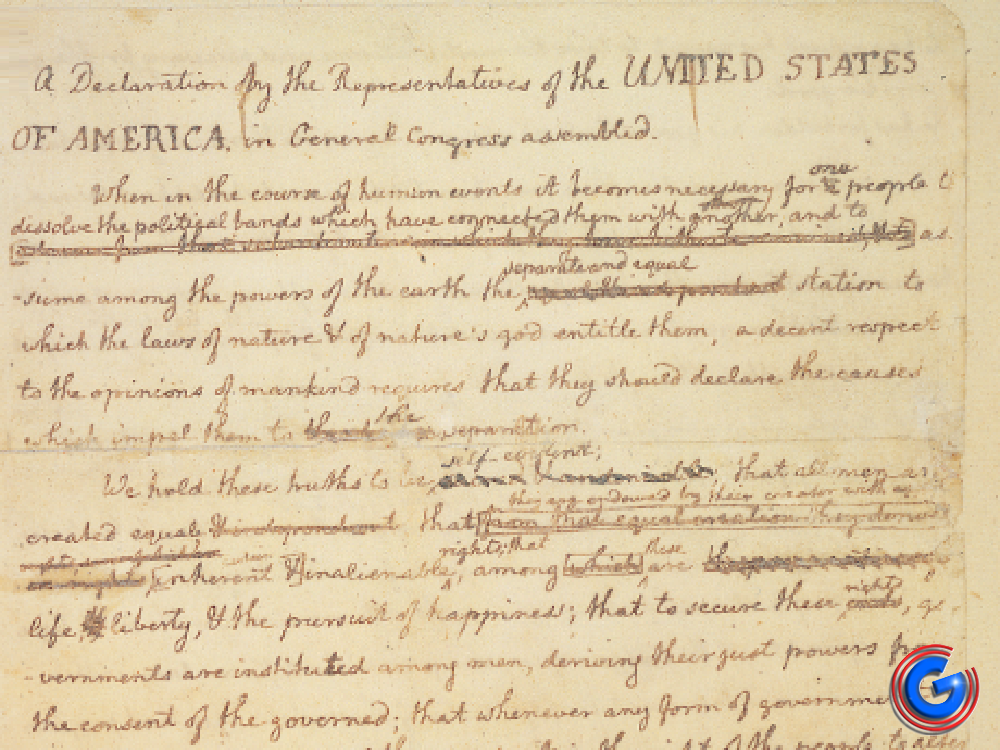Rutherford County, TN - As we celebrate America's 249th anniversary and look around to find one of this nation's fastest growing areas with the public considering TRAFFIC as a major concern, it's logical to think back to what was happening here when our forefathers were signing that document. In fact, Tennessee was not one of the original 13 colonies that created this document. The Volunteer State was admitted to the Union as the 16th state on June 1, 1796. NOTE: Declaration of Independence is at the bottom of this article.
The Birth Years
July 4, 1776—a date carved in American memory, but in what is now Rutherford County, Tennessee--the fire of independence felt like a distant spark.
At that time, the land was a dense wilderness, unmarred by roads or fences. It was sacred territory for the Cherokee, Chickasaw, and Creek peoples, who used it not as a permanent home, but as abundant hunting grounds. The rivers ran wild, the forests teemed with game, and tribal tradition held the land in balance. Settlements were scarce—intentionally so.
Nashville
Timothy Demonbreun, the French-Canadian fur trader often called the first citizen of Nashville, had already begun exploring Middle Tennessee by 1766, ten years before the Revolution. Living seasonally in a bluffside cave near the Cumberland River, he trapped and traded with local Native populations, his presence preceding the founding of Nashville itself. Still, throughout the 1770s and into the early 1800s, this area we call home was a rugged and remote frontier.
As the Revolutionary War raged on, men who would later become prominent Tennesseans, were fighting for a country not yet born. One of them, Captain William Lytle, would eventually be rewarded for his service with frontier land grants, which brought him to this part of Middle Tennessee decades later. But it wasn’t until 1803—27 years after the Declaration of Independence—that the area was formally recognized as Rutherford County, named after Revolutionary War General Griffith Rutherford.
In 1804, Andrew Jackson—still a young lawyer and military figure—purchased a plot of land east of Nashville known as The Hermitage. He and his wife Rachel moved into a simple log cabin there, unknowingly planting the roots of what would become a large cotton plantation and a pivotal homestead in American history. Legend holds that around the same time, Cherokee leader Black Fox made a daring escape from enemy troops—possibly Jackson’s men—by diving into what is now Todd’s Lake and resurfacing nearly three miles away at Murfree Spring, near the present-day Discovery Center. This folkloric tale, passed down through generations, still echoes in the name "Black Fox Camp Spring." (see historical plaques at the spring behind the Discovery Center)
The Early Years
Locally, development began to stir in earnest in 1811—35 years after independence—when the Tennessee General Assembly chose a site for the Rutherford County seat. First called Cannonsburgh, it was renamed Murfreesborough in short order, in honor of Revolutionary War veteran Colonel Hardy Murfree. By 1818, the town had grown prominent enough to become the capital of Tennessee, a title it held until 1826.
As Murfreesboro took shape, so too did some of its most storied landmarks. In the late 1810s, Dr. James Maney and his wife Sallie Murfree Maney, daughter of Col. Hardy Murfree, built a modest brick home that would evolve into Oaklands Mansion. With slave labor and growing wealth, the estate flourished to nearly 1,500 acres, its Italianate structure a symbol of antebellum affluence. But Oaklands also bore witness to the darkest chapters of history. Nearly 100 enslaved people lived and labored there by 1840. During the Civil War, the home was engulfed in violence, surprise raids, and hospital duty, treating both Union and Confederate wounded. Even Confederate President Jefferson Davis reportedly stayed the night in December 1862.
Around that same era, just 15 miles north in Smyrna, another boy would grow into legend. Sam Davis was born in 1842 and raised on a family plantation founded with a log cabin built in 1810. As a Confederate courier, he was captured in 1863 carrying Union secrets. Refusing to betray his informant—even under threat of death—he was hanged at just 21. His final words, “If I had a thousand lives, I would give them all before I would betray a friend,” are etched into Tennessee memory.
Today, those stories—both factual and folkloric—form the foundation beneath our feet. While nothing here looked like the American Revolution 249 years ago, the seeds of Murfreesboro’s spirit were stirring beneath the surface—waiting, watching, and, eventually, rising.
Declaration of Independence
Signed in Congress, July 4, 1776 (spellings and punctuation are as originally created 249-years ago)
The unanimous Declaration of the thirteen united States of America, When in the Course of human events, it becomes necessary for one people to dissolve the political bands which have connected them with another, and to assume among the powers of the earth, the separate and equal station to which the Laws of Nature and of Nature's God entitle them, a decent respect to the opinions of mankind requires that they should declare the causes which impel them to the separation.
We hold these truths to be self-evident, that all men are created equal, that they are endowed by their Creator with certain unalienable Rights, that among these are Life, Liberty and the pursuit of Happiness.--That to secure these rights, Governments are instituted among Men, deriving their just powers from the consent of the governed, --That whenever any Form of Government becomes destructive of these ends, it is the Right of the People to alter or to abolish it, and to institute new Government, laying its foundation on such principles and organizing its powers in such form, as to them shall seem most likely to effect their Safety and Happiness. Prudence, indeed, will dictate that Governments long established should not be changed for light and transient causes; and accordingly all experience hath shewn, that mankind are more disposed to suffer, while evils are sufferable, than to right themselves by abolishing the forms to which they are accustomed. But when a long train of abuses and usurpations, pursuing invariably the same Object evinces a design to reduce them under absolute Despotism, it is their right, it is their duty, to throw off such Government, and to provide new Guards for their future security.--Such has been the patient sufferance of these Colonies; and such is now the necessity which constrains them to alter their former Systems of Government. The history of the present King of Great Britain is a history of repeated injuries and usurpations, all having in direct object the establishment of an absolute Tyranny over these States. To prove this, let Facts be submitted to a candid world.
He has refused his Assent to Laws, the most wholesome and necessary for the public good.
He has forbidden his Governors to pass Laws of immediate and pressing importance, unless suspended in their operation till his Assent should be obtained; and when so suspended, he has utterly neglected to attend to them.
He has refused to pass other Laws for the accommodation of large districts of people, unless those people would relinquish the right of Representation in the Legislature, a right inestimable to them and formidable to tyrants only.
He has called together legislative bodies at places unusual, uncomfortable, and distant from the depository of their public Records, for the sole purpose of fatiguing them into compliance with his measures.
He has dissolved Representative Houses repeatedly, for opposing with manly firmness his invasions on the rights of the people.
He has refused for a long time, after such dissolutions, to cause others to be elected; whereby the Legislative powers, incapable of Annihilation, have returned to the People at large for their exercise; the State remaining in the mean time exposed to all the dangers of invasion from without, and convulsions within.
He has endeavoured to prevent the population of these States; for that purpose obstructing the Laws for Naturalization of Foreigners; refusing to pass others to encourage their migrations hither, and raising the conditions of new Appropriations of Lands.
He has obstructed the Administration of Justice, by refusing his Assent to Laws for establishing Judiciary powers.
He has made Judges dependent on his Will alone, for the tenure of their offices, and the amount and payment of their salaries.
He has erected a multitude of New Offices, and sent hither swarms of Officers to harrass our people, and eat out their substance.
He has kept among us, in times of peace, Standing Armies without the Consent of our legislatures.
He has affected to render the Military independent of and superior to the Civil power.
He has combined with others to subject us to a jurisdiction foreign to our constitution, and unacknowledged by our laws; giving his Assent to their Acts of pretended Legislation:
For Quartering large bodies of armed troops among us:
For protecting them, by a mock Trial, from punishment for any Murders which they should commit on the Inhabitants of these States:
For cutting off our Trade with all parts of the world:
For imposing Taxes on us without our Consent:
For depriving us in many cases, of the benefits of Trial by Jury:
For transporting us beyond Seas to be tried for pretended offences:
For abolishing the free System of English Laws in a neighbouring Province, establishing therein an Arbitrary government, and enlarging its Boundaries so as to render it at once an example and fit instrument for introducing the same absolute rule into these Colonies:
For taking away our Charters, abolishing our most valuable Laws, and altering fundamentally the Forms of our Governments:
For suspending our own Legislatures, and declaring themselves invested with power to legislate for us in all cases whatsoever.
He has abdicated Government here, by declaring us out of his Protection and waging War against us.
He has plundered our seas, ravaged our Coasts, burnt our towns, and destroyed the lives of our people.
He is at this time transporting large Armies of foreign Mercenaries to compleat the works of death, desolation and tyranny, already begun with circumstances of Cruelty & perfidy scarcely paralleled in the most barbarous ages, and totally unworthy the Head of a civilized nation.
He has constrained our fellow Citizens taken Captive on the high Seas to bear Arms against their Country, to become the executioners of their friends and Brethren, or to fall themselves by their Hands.
He has excited domestic insurrections amongst us, and has endeavoured to bring on the inhabitants of our frontiers, the merciless Indian Savages, whose known rule of warfare, is an undistinguished destruction of all ages, sexes and conditions.
In every stage of these Oppressions We have Petitioned for Redress in the most humble terms: Our repeated Petitions have been answered only by repeated injury. A Prince, whose character is thus marked by every act which may define a Tyrant, is unfit to be the ruler of a free people.
Nor have We been wanting in attentions to our Brittish brethren. We have warned them from time to time of attempts by their legislature to extend an unwarrantable jurisdiction over us. We have reminded them of the circumstances of our emigration and settlement here. We have appealed to their native justice and magnanimity, and we have conjured them by the ties of our common kindred to disavow these usurpations, which, would inevitably interrupt our connections and correspondence. They too have been deaf to the voice of justice and of consanguinity. We must, therefore, acquiesce in the necessity, which denounces our Separation, and hold them, as we hold the rest of mankind, Enemies in War, in Peace Friends.
We, therefore, the Representatives of the united States of America, in General Congress, Assembled, appealing to the Supreme Judge of the world for the rectitude of our intentions, do, in the Name, and by Authority of the good People of these Colonies, solemnly publish and declare, That these United Colonies are, and of Right ought to be Free and Independent States; that they are Absolved from all Allegiance to the British Crown, and that all political connection between them and the State of Great Britain, is and ought to be totally dissolved; and that as Free and Independent States, they have full Power to levy War, conclude Peace, contract Alliances, establish Commerce, and to do all other Acts and Things which Independent States may of right do. And for the support of this Declaration, with a firm reliance on the protection of divine Providence, we mutually pledge to each other our Lives, our Fortunes and our sacred Honor.





